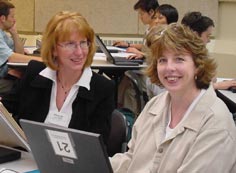 |
|
|||

|
The national foreign language standards, unveiled in 1996, offer eleven standards organized under five goal areas. The standards describe what students should know and be able to do with language. Statement of Philosophy (from the ACTFL
National Standards publication, p. 7) Why should language teachers learn about the national foreign language standards? (Quotes from the ACTFL National Standards publication) "Standards are intended to serve as a gauge for excellence as states and local districts carry out their responsibilities for curriculum in the schools." (p. 95) "Informed teachers will recognize within the standards the work that has preceded this initiative under rubrics of proficiency-oriented or communication-based instruction, as well as the broadening of the teaching of target cultures to encompass lifestyle and civilization." (p. 95) "[The standards] are intended to serve as a model to state and local policy makers and curriculum developers as they reconsider the role of foreign languages in their schools." (p. 95) "The standards require a much broader definition of the content of the language classroom, one in which students are given ample opportunities to explore, develop, and use communication strategies, learning strategies, and critical thinking skills, as well as the appropriate elements of the language system and culture." (p. 97) "We hope that those who use this document to modify or change fundamentally the way they look at language learning will see these standards as a starting point for more clearly defining what students should know and be able to do as a result of language study." (p. 65)
|
|||